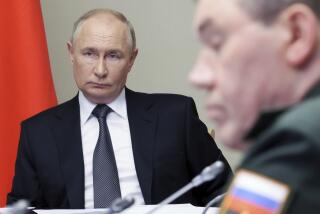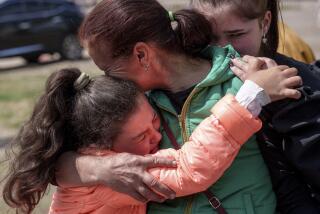Yeltsin Takes Direct Control of Russian Military : Defense: Efforts of Commonwealth to keep forces unified appear to be doomed.
- Share via
MOSCOW — Russian President Boris N. Yeltsin assumed direct control over most of the former Soviet armed forces Monday, creating a Russian Defense Ministry and appointing himself its acting chief.
The hundreds of thousands of troops on Russian territory, technically, will remain for now under “operational command” of the Commonwealth of Independent States’ military, according to Deputy Russian Prime Minister Sergei M. Shakhrai, who announced Yeltsin’s decree.
But in a move that paved the way for the official formation of a Russian national force, Yeltsin said that the troops, henceforth, also will come under the jurisdiction of his own Russian government. He said he will define their strategic tasks and handle their budget and personnel changes.
Yeltsin had long resisted forming a Russian military. But with former Soviet officers increasingly restive politically and smarting under drastic defense cuts and reforms, the Russian government apparently felt forced to take them in hand. “It was turning into an abnormal situation,” Shakhrai said, “in which the army existed outside any state.”
Kazakhstan, the second-largest Commonwealth member, went a step further Monday, decreeing the formation of its own “Republican Guard.” It will obey only the Central Asian republic’s president, according to the Russian news agency Itar-Tass.
Taken together, the announcements by Kazakhstan and Russia appeared to doom Commonwealth attempts to keep virtually all of the 3.7-million-strong Soviet armed forces together under united command.
Leaders of the 11 Commonwealth states have managed to agree only on joint nuclear forces; even that fragile consensus was shaken last week by Ukraine’s announcement--which its leaders sought to clarify over the weekend after it aroused international concern--that it had stopped shipping its tactical nuclear weapons to Russia for destruction.
Yeltsin’s insistence on joint Commonwealth conventional forces--that would, nonetheless, clearly be dominated by Russia--gave way before the demands of leaders from Ukraine, Azerbaijan and other former Soviet republics. They have insisted on having their own forces and have already begun forming them.
Shakhrai said the Russian Defense Ministry will initially stay out of “operational command” of troops, leaving that to the Commonwealth commander, Air Marshal Yevgeny I. Shaposhnikov, and his officers. Instead, Russian leaders said they will focus on budgeting and “technical and material support.”
The exact number of former Soviet troops on Russian territory has not been made public. But Shakhrai said that most former Soviet soldiers are now stationed in Russia, and Yeltsin’s military adviser, Col. Gen. Dmitri Volkogonov, told Parliament officials that Russian troops could number 1.5 million within two years.
Yeltsin also claimed control on Monday over Soviet forces still abroad, including those in Mongolia, Cuba and Eastern Europe, according to Russian Television.
With his new post as acting defense minister, Yeltsin now occupies the top three executive jobs in the country as president, prime minister--who oversees the economy and day-to-day government affairs--and defense minister.
But Shakhrai bridled at suggestions that Yeltsin’s authoritarian streak was showing, arguing that the president was forced to take the defense post himself as an interim measure to stave off infighting between “generals and democratic deputies. This struggle could have a very gloomy outcome,” he warned.
Eventually, Shakhrai said, Parliament will pass full legislation on the Defense Ministry and probably rule that a civilian must head it. But for now, he indicated, Yeltsin’s move should seem no more threatening than that of any Western president assuming the mantle of commander in chief of the national armed forces.
“We have so frightened ourselves with the threat of totalitarianism and dictatorship that we are scared of our own shadows,” he said.
The defense decree was Yeltsin’s first major move after returning to Moscow on Monday from a Black Sea “working vacation.” On Friday, he is scheduled to attend a key meeting of Commonwealth leaders in the Ukrainian capital of Kiev, mainly to continue working out military issues. These are expected to include details of the joint forces’ command and border defense, issues made all the more urgent by ethnic disputes simmering on the Commonwealth’s periphery.
In the Caucasus Mountains enclave of Nagorno-Karabakh on Monday, fighting between Armenian and Azerbaijani militants continued unabated despite a truce reached in Tehran.
Fourteen people were killed in battles in the Azerbaijani-populated town of Shusha in Nagorno-Karabakh and eight more in the town of Agdam over the border in Azerbaijan proper, the Russian news agency Interfax reported.
Armenian sources reported heavy shelling of the Armenian-populated village of Karachinar and further attacks on Stepanakert, Nagorno-Karabakh’s capital.
In continuing ethnic strife in Moldova, on the southwestern edge of the former Soviet Union, a state of emergency was declared Monday in the breakaway region known as the Dniester Republic. Fighting between Moldovans, who are ethnic Romanians, and the Russian-speaking population of the Dniester Republic has reportedly killed 22 people this month.
Meantime, Russian and Kazakhstan spokesmen denied Monday that the chaos of the post-Soviet era has reached the point that nuclear arms, formerly under the Soviet military’s aegis, are being sold abroad by unscrupulous dealers. They sought to counteract a weekend report in the German magazine Stern that Iran has bought two mid-range nuclear missiles in Kazakhstan.
Commonwealth spokesmen told Interfax that it makes no sense to sell nuclear missiles without the complex system needed for launching them and asserted that, in any case, all nuclear weapons remain under strict control. Kazakh officials maintained that they, too, would never allow such loose control on weapons of mass destruction.
In Washington, State Department spokeswoman Margaret Tutwiler said the Bush Administration was “very reassured” that Ukraine has not backed away from its pledge to destroy all nuclear weapons deployed on its territory, despite its announced halt to shipments of tactical arms to Russia for destruction.
Ukrainian officials said over the weekend that they wanted the nuclear arms destroyed eventually, but that they are concerned that the Russian government may not be doing so.
More to Read
Sign up for Essential California
The most important California stories and recommendations in your inbox every morning.
You may occasionally receive promotional content from the Los Angeles Times.













